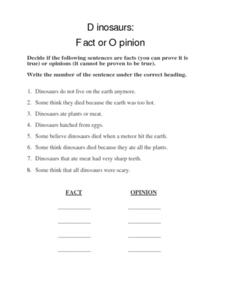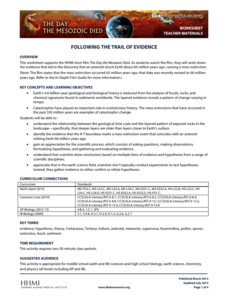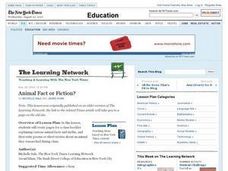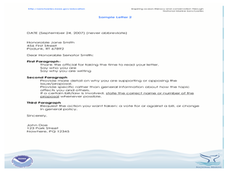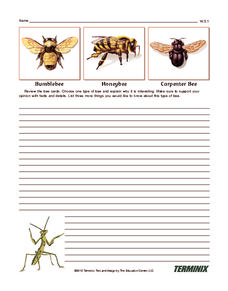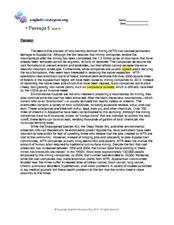Curated OER
Dinosaurs: Fact or Opinion
In this fact or opinion worksheet, students evaluate 8 statements about dinosaurs and then determine whether each statement is a fact or an opinion by writing the number that corresponds to each statement in a column labeled fact or...
Curated OER
Lesson 3: Proving Facts and Forming Opinions
Time for Kids: Butterflies is used to model the process of determining if a text is based on fact or opinion. Children are taught how to skim for key words, and use headings or chapter names to locate proof of whether or not what...
Curated OER
Facts or Opinions - Wonderful Worms
Students watch a video about how the worm's value affects the environment and create a fact and opinion chart about it. In this fact and opinion lesson plan, students create a 2 column chart analyzing what is fact and what is opinion...
Curated OER
Fact or Opinion Graphic Organizer
In this graphic organizer worksheet, students read the difference between a fact and an opinion. They identify a topic and write facts or opinions in the chart to help them organize their thoughts and information.
Curated OER
Animal Facts and Opinions
In this fact and opinion learning exercise, students read 20 informative sentences about animals. Students write "fact" or "opinion" for each sentence.
Curated OER
Fact and Opinion
In this graphic organizer worksheet, students develop a topic and add details to support the topic. Students list the details as fact or opinion.
Howard Hughes Medical Institute
Following the Trail of Evidence
One important skill in analyzing scientific evidence is identifying facts versus opinions. Scholars identify pieces of evidence from the film The Day the Mesozoic Died and then discuss this evidence in small groups at the end of each act...
Curated OER
Fact or Opinion-Manatees
Students decipher factual information about manatees. In this biological science lesson, students research characteristics about manatees. They use that information to separate facts from common opinions about the...
Curated OER
Fact vs. Opinion: Theory, Hypothesis, and Bias
Emphasize the differences between a theory and a hypothesis to teach your class how to avoid scientific bias.
Curated OER
The Buzz about Fact and Opinion
Students distinguish facts from opinions. In this biological science lesson, students research information on bees to decipher what things are proven true versus assumed. They view a video and discuss what makes the...
Curated OER
Forming an Opinion with Organizational Elements - Cats, Yesterday and Today
In this age of information overload, it is often difficult for young people to know what they think about a topic. The graphic organizer, video, and activities included with this resource show middle schoolers how to use proven facts to...
Curated OER
Animal Fact or Fiction?
Read and discuss the article "Welcome to Cicadaville (Enter at Your Own Risk)" to gain a better understanding around the confusion regarding cicadas and locust swarms. In groups your young analysts research statements about animals to...
Curated OER
In My Opinion
Young writers craft letters to the government stating their opinion on different topics. They pick an environmental or ocean issue, research it, and craft their formal persuasive letter. Ensure your learners include supporting facts and...
Curated OER
What Is the Nature of Science?
Students distinguish between scientific and everyday meanings of key words-theory, hypothesis, law, fact-and use in context. They recognize the variables that affect observation, data collection, and interpretation. They discover the...
Curated OER
Endangered Rain Forest Research and Opinion Paper
In this endangered rain forest research and opinion research worksheet, students research factors that cause the destruction of rain forest. They read two opinion statements before deciding on one to respond to with data from their...
Beyond Benign
The Story of Cosmetics Video Assessment
Does your shampoo contain carcinogens? Scholars learn how cosmetic companies create and market their products, many of which contain toxic chemicals. They examine the bias and consumer responsibilities in the industry.
Curated OER
Don't Let the Earth Down
Writing a persuasive argument starts with a clear thesis. Using this resource, your class will write a persuasive paper on a conservation issue. They will then transform their argument into a 30-second public service announcement. If...
Terminix
Bee Writing Prompt
What do your pupils know about bees? Ask them to examine facts and images about three different types of bees and write about one type. Pupils explain why their chosen bee is interesting and back up their ideas with facts and opinions....
Beyond Benign
Medical Ethics
Just because we have the ability to determine an organism's traits through genetic testing, should we do it? Middle-school medical experts examine the ethical dilemmas in biotechnology in the 18th and final installment in a series of...
Serendip
Golden Rice – Evaluating the Pros and Cons
More than half the world's population eats rice as a daily staple ... imagine if that rice could prevent illness. Scientists genetically engineered rice to include vitamin A for just that purpose. However, room for debate still exists....
Curated OER
Reading Comprehension 5: Level 10
Whether used as a reading comprehension assessment, as the basis of a mini-lesson on reading strategies, or as extra practice, this exercise will prove to be valuable because of the answers and explanation key that accompanies the...
Curated OER
Ethical and Critical Thinking: Genetically Modified Food
Students read statements representing different points of view on Genetically Modified Food. They identify the "facts" and "opinions" in each statement, and then briefly summarize the issue of Genetically Modified Food in a short...
Curated OER
Lead Critical Reading
Students read opposing views on the lead contamination issue, identify the facts and opinions in each article, and infer the opinion of the author. They create an essay expressing their opinion on the issue complete with citations.
Curated OER
Food Myths Critical Thinking and Reading
Students read a series of statements made by students about the hazards and benefits of various foods. They distinguish the "facts: from "opinions" in the dialogue, summarize the facts in a short paragraph, and write an essay...
Other popular searches
- Fact Opinion Lesson Plans
- Fact and Opinion Passages
- Fact Opinion Worksheet
- Fact and Opinion Lessons
- Teaching Fact vs. Opinion
- Fact and Opinion Worksheets
- Teaching Fact and Opinion
- Fact and Opinion Games
- Reading Fact and Opinion
- Fact and Opinion Keywords
- Identifying Fact or Opinion
- Fact Opinion Quiz
